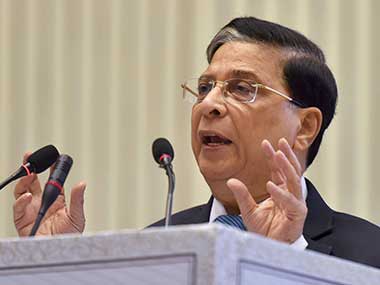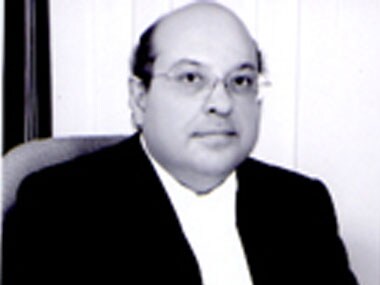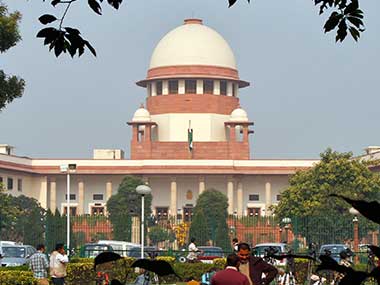On Thursday morning, Indu Malhotra was sworn in as a Supreme Court judge, making her the first woman to be appointed as a judge in the apex court.
Chief Justice Dipak Misra administered Malhotra the oath of office, making her the 25th judge of the Supreme Court of India. Meanwhile, the BJP-led government at the Centre widened the rift between judiciary and the executive after it asked the Supreme Court collegium to reconsider its recommendation to elevate Justice KM Joseph to the apex court.
In response, the Supreme Court Bar Association slammed the move terming as "disturbing" the government's action of accepting only one name (Indu Malhotra) and asking it to reconsider the name of Justice Joseph.
Among the 24 sitting judges (not including Malhotra), six are set to retire this year. Here's a brief profile of all the current judges at the apex court:

A file image of Chief Justice of India Dipak Misra. PTI
Dipak Misra
The Chief Justice of India, Dipak Misra, began his career in law when he enrolled as an advocate on 14 February, 1977. Born in October 1953, he practiced, civil, constitutional, criminal, revenue, services and sales tax matters in the Orissa High Court before moving to the Madhya Pradesh High Court. He served as the chief justice of the Patna High Court before taking over as chief justice of Delhi High Court in May 2010. He was appointed as a Supreme Court judge on 10 October, 2011 and became the CJI on 28 August, 2017. Misra is due to retire from office on 2 October this year.
Jasti Chelameswar
Born in Krishna district of Andhra Pradesh, Justice Chelameswar graduated in law from Visakhapatnam's Andhra University in 1976. He has previously served as the chief justice of Gauhati High Court and Kerala High Court. He was elevated as a Supreme Court judge on 10 October, 2011, and is set to retire on 22 June.
Ranjan Gogoi
Justice Gogoi joined the Bar in 1978 and practiced mainly in the Gauhati High Court. In September 2010, he was transferred to the Punjab and Haryana High Court and appointed as the chief justice of the same court on 12 February, 2011. He was elevated as a Supreme Court judge on 23 April, 2012 with a tenure of six years, set to end on 30 December, 2018.
Madan Bhimarao Lokur
A Delhi University alum, Justice Lokur practiced in the Delhi High Court and the apex court. He qualified and enrolled as an Advocate-on-Record in the Supreme Court in 1981. He served as the Central Government Standing Counsel from December 1990 to December 1996, where he represented the Government of India for all sorts of cases including criminal trials with respect to economic offences.
Justice Lokur was appointed as the Additional Solicitor General of India on 14 July, 1998 and continued till February 1999. He served as the chief justice of Gauhati High Court and High Court of Andhra Pradesh before being appointed as a Supreme Court judge on 4 June, 2012. As per the Supreme Court website, he has an interest in "judicial reforms, computerisation of courts, judicial education, legal aid and services, juvenile justice and ADR." He was also appointed as a one man committee to suggest improvements in juvenile homes and organisations under the Juvenile Justice (Care and Protection and Children) Act, 2000 and the Juvenile Justice (Care and Protection of Children) Rules, 2007.

File image of the Supreme Court of India. Reuters
Kurian Joseph
Born in Kerala, Justice Joseph began his legal practice in 1979 and served twice as the acting chief justice of the Kerala High Court. He served as the chief justice of the Himachal Pradesh High Court from 8 February, 2010 to 7 March, 2013 before being appointed as a Supreme Court judge the next day. He is set to retire on 30 November this year.
Arjan Kumar Sikri
Another Delhi University alum, Justice Sikri holds a shining academic record. He secured the first position in all the six semesters while doing his LL.B and LL.M and won prizes and medals for all sorts of extra curricular activities. He enrolled with the Delhi Bar Council in 1977 and specialised in Constitutional cases, labour (service matters) and arbitration matters. He was appointed as Delhi High Court in 1999 and became the acting chief justice on 10 October, 2011. He served as the chief justice of the Punjab and Haryana High Court before being elevated as a Supreme Court judge on 12 April, 2013. His tenure ends in March 2019.
Sharad Arvind Bobde
Justice Bobde, born in Nagpur, practiced law at the Nagpur Bench of the Bombay High Court for over 21 years. He was sworn in as the chief justice of the Madhya Pradesh High Court in 2012 and was appointed a an apex court judge on 12 April, 2013.
RK Agrawal
Justice Rajesh Kumar Agrawal graduated in law from Uttar Pradesh's Allahabad University. He enrolled as an advocate in 1976 and dealt with constitutional, company, service, educational and taxation matters. He was also the Standing Counsel for the Income Tax department for the Union government. He assumed the office of the chief justice of the Madras High Court on 24 October, 2013 before being elevated as a Supreme Court judge on 17 February, 2014. He will retire on 4 May this year.
NV Ramana
Born in an agricultural family in Andhra Pradesh, Justice Ramana practiced law in the Andhra Pradesh High Court and the Supreme Court of India. He was elevated as the Delhi High Court chief justice on 2 September, 2013. He has been serving as a Supreme Court judge since 17 February, 2014 with his tenure extending till 2022.
Arun Mishra
Having served as judge at the Madhya Pradesh, Rajasthan and Calcutta high courts, Justice Mishra has decided approximately 97,000 cases during his tenures. He joined the Bar in 1978 and practiced constitutional, civil, industrial, service and criminal matters. He was elected as the youngest chairman of the Bar Council of India (1998-99) and also served as its vice-chairman. He served as the chief justice at the Rajasthan and Calcutta high courts before being sworn in as a Supreme Court judge on 7 July, 2014, with his tenure set to end in September 2020.
Adarsh Kumar Goel
Hailing from Hissar, Haryana, Justice Goel practiced before the Supreme Court and Delhi High Court for nearly 22 years. He was wworn in as the chief justice of the Gauhati High Court on 20 December, 2011 and later took over as the Orissa High Court chief justice on 12 October, 2013. He assumed the charge of judgeship at the Supreme Court on 7 July, 2014 and will retire on 6 July.

File image of Supreme Court judge RF Nariman. Image courtesy: supremecourtofindia.nic.in
RF Nariman
Born in 1956, Justice Rohinton Fali Nariman is a Harvard Law School alum. He was made the Senior Counsel at the Supreme Court at the young age of 37 as against the mandatory 45 years. The CJI at the time, Justice Venkatachalaiah, amended the rules in order to do so.
Justice Nariman is an expert in comparative constitutional law and civil law and has 500 reported Supreme Court judgments to his credit. He is an ordained priest from the Bandra Agiary and is an avid reader of history, philosophy, literature and science with a deep interest in western classical music. He served as the Solicitor General of India from 27 July, 2011 to 4 February, 2013. He became a Supreme Court judge on 7 July 2014 and will retire in 2021.
Abhay Manohar Sapre
Justice Sapre was sworn in as an apex court judge on 13 August, 2014 and served as the chief justice of the Manipur and Gauhati high courts prior to it. He began his legal career in 1978 and practiced civil, constitutional and labour law at the Madhya Pradesh High Court in Jabalpur.
R Banumathi
Justice Banumathi is the first woman Supreme Court judge from Tamil Nadu, who began her career in 1981. She initially practiced at mofussil courts in Tirupattur, Krishnagiri and Harur before serving as the District and Sessions judge in various districts of the state. She became the Jharkhand High Court chief justice on 16 November, 2013 and was instrumental in improving district judiciary infrastructure, recruitment, and filling up vacancies in the ministerial staff. She was sworn in as a Supreme Court judge on 13 August, 2014 and will continue till July 2020.
Uday Umesh Lalit
Justice Lalit enrolled as an advocate in June 1983 and practiced in the Bombay High Court till December 1985, after which he shifted practice to New Delhi. He was designated as asenior advocate in the Supreme Court in 2004 and has appeared as Amicus Curiae in several cases. He was appointed as the special public prosecutor for the CBI in the 2G scam. He was sworn in as an apex court judge on 13 August, 2014.

Representational image. Reuters
AM Khanwilkar
Born in Pune in July 1957, Justice Khanwilkar studied law in Mumbai and enrolled as an advocate in February 1982. He served as the chief justice of the Madhya Pradesh and Himachal Pradesh high courts before being confirmed as a Supreme Court judge on 13 May, 2016. He is due to retire in July 2022.
DY Chandrachud
Appointed as a Supreme Court judge on 13 May, 2016, Justice Chandrachud previously served as a Bombay High Court judge and chief justice of the Allahabad High Court (2013-2016). He has practiced law at the Bombay High Court and the Supreme Court.
Ashok Bhushan
Justice Bhushan enrolled as an advocate with the Uttar Pradesh Bar Council in April 1979 and practiced at the Allahabad High Court till his elevation to the bench. He also served as a judge and chief justice of the Kerala High Court before being elevated to the Supreme Court on 13 May, 2016.
L Nageswara Rao
Hailing from Prakasam district in Andhra Pradesh, Justice Nageswara Rao practiced at the state high court from 1985 to 1994 in Hyderabad. Between 1995 and May 2016, he practiced law at the Supreme Court before his elevation as an apex court judge on 13 May, 2016. He also served as Additional Solicitor General of India twice from August 2003 to May 2004 and August 2013 to December 2014.
Sanjay Kishan Kaul
Justice Kaul began his legal career in 1982 and largely practiced in the commercial, civil, writ, original and company jurisdictions of the Delhi High Court and Supreme Court. He was appointed as a permanent judge to the Delhi High Court in 2003. He also served as the acting chief justice of the Delhi High Court for three days in September 2012. He was also the chief justice of the Madras High Court (appointed in 2013) and the Punjab and Haryana High Court (appointed in 2014). He became a Supreme Court judge on 17 February, 2017.
Mohan M Shantanagoudar
Elevated as a Supreme Court judge on 17 February, 2017, Justice Shantanagoudar began his career in Dharwad, Karnataka before moving to Bengaluru where he joined the Chambers of advocate Shivraj V Patil. He began his independent practice in 1984 and mainly dealt with civil, criminal and constitutional matters. He served as the vice-chairman, and subsequently chairman of the Karnataka State Bar Council between 1991 and 1996. He also served as the chief justice of the Kerala High Court.
S Abdul Nazeer
Born in 1958, Justice Nazeer practiced in the Karnataka High Court before being elevated as a permanent judge in September 2004. He became a judge at the Supreme Court on 17 February, 2017.
Navin Sinha
Justice Sinha previously practiced at the Patna High Court for 23 years on civil, constitutional, labour, service, commercial, company and criminal matters. Appointed as a permanent judge to the Patna High Court in February, 2004, he later became the chief justice of the Rajasthan High Court in 2016. He was elevated as a Supreme Court judge on 17 February, 2017.
Deepak Gupta
Hailing from a family of lawyers in Himachal Pradesh, Justice Gupta practiced in the state high court court and was later appointed as the judge to the Himachal Pradesh High Court on 4 October, 2004. He also served as the chief justice in the high courts of Tripura and Chhattisgarh before being sworn in as a Supreme Court judge on 17 February, 2017.
With inputs from agencies
Updated Date: Apr 27, 2018 11:26 AM